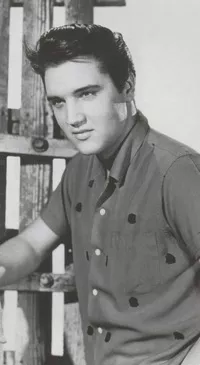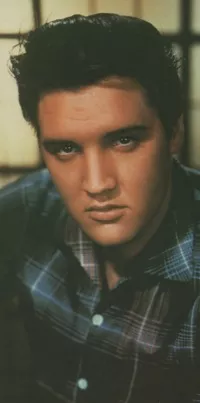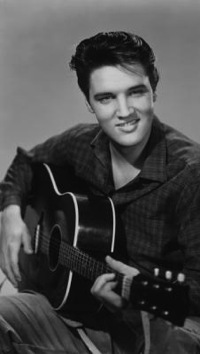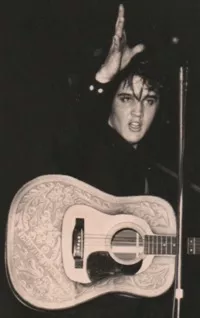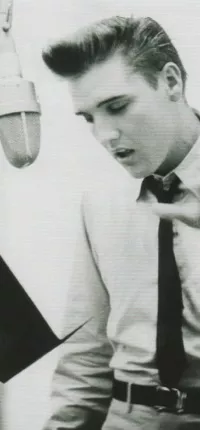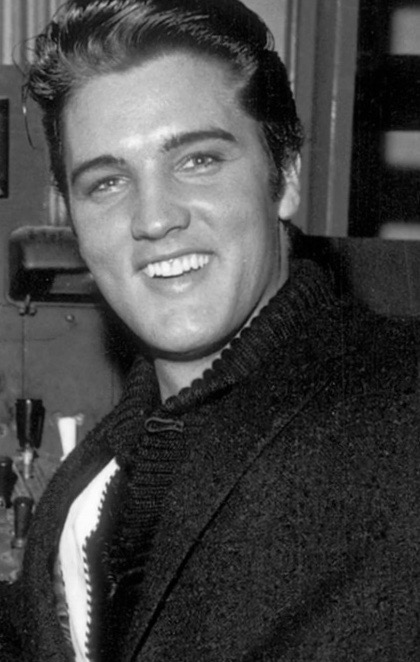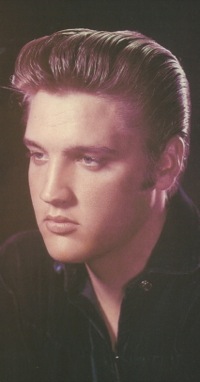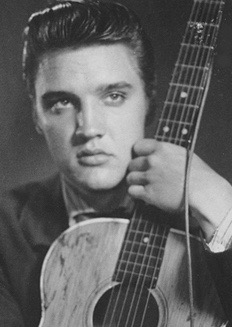Elvis History Blog
“Hound Dog” on ’56 Berle Show
Was Elvis' Top R&R Moment
The King of Rock ’n’ roll obviously had many notable rock ’n’ roll moments during his career, but Elvis Presley’s single most significant musical performance came on June 5, 1956, when he appeared on Milton Berle’s nationally televised variety show. His sexually-charged rendition of “Hound Dog” that evening and the virulent condemnation of it that flowed from the press and the pulpit, pushed Presley to the forefront in the cultural battle for the hearts of minds of teenagers in the mid-fifties.

By early June 1956, the nation certainly knew who Elvis Presley was. He already had appeared on national TV seven times, including an earlier appearance on Milton Berle’s show on April 3. His personal appearances across the country had begun to draw huge crowds along with criticism from local and national press outlets. After the June 5 Berle show, however, Presley’s profile exploded. His role as a polarizing figure expanded. He attracted larger crowds and defenders on one hand and more increasingly inflamed critics on the other.
Several factors made Presley’s second performance on the Milton Berle Show different from his previous TV appearances. First, there was the decision to perform “Hound Dog” on the show. Elvis had been using the provocative number in his stage show for some time, but this was the first time the entire country would see it on the small screen. While playing a two-week stint in Las Vegas in late April and early May, Elvis had seen Freddie Bell and the Bellboys perform “Hound Dog” in their Vegas lounge act.
“We loved the way they did it,” remembers guitarist Scotty Moore. “They had a piano player who stood up and played—and the way he did his legs, they looked like rubber bands bending back and forth. Jerry Leiber and Mike Stoller wrote the song for Big Mama Thornton, but Freddie and the Bellboys had a different set of lyrics. Elvis got his lyrics from those guys. He knew the original lyrics, but he didn’t use them.”
• Elvis wanted to sing ballads like Belafonte
After finishing up in Las Vegas, Elvis began using “Hound Dog” to close his road show. He had 17 bookings between May 13 and June 3, and so he had his raucous version of the song nailed down by the time he and the boys arrived in Los Angeles on June 4 for the Berle show. Several reporters and columnists were on hand for the rehearsal that day. Other scheduled guests included actress Debra Paget, “Sheena of the Jungle” actress Irish McCalla, and seven-year-old Barry “Boy Wonder” Gordon, “but Elvis is the big one in the spotlight now,” noted Herald-Express columnist Bob Hull.

The rehearsal discussion with the press seemed to down play Elvis’ rowdy rock ’n’ roll reputation. Berle told the assembled journalists, “This kid sings to music the way kids who love him talk.” Elvis added, “All I do is sing … I want to sing ballads, stuff like the things Harry Belafonte does. I can’t help it if rock and roll happens to be popular now. I enjoy it and get a kick out of it.”
Bob Hull came away with a laid-back impression of Presley. “Elvis … is not a bit like his singing style,” he concluded in his Herald-Express column the next morning. “You would expect him to be a real hep-cat, ‘diggable’ character, which he isn’t. He’s just a normal young man who happens to have a salable style, three Cadillacs, two diamond rings, a jewel-studded watch and a ‘mission’ in life.”
Of Elvis’ style, Hull explained, “He actually rocks-and-rolls his body when he’s warbling the R&R numbers. Some folks, mostly in the elderly group, have taken exception to this, saying it’s ‘exhibitionism.’ Some, like the nowhere-aged Berle, say it’s showmanship.” Obviously, Hull didn’t anticipate the stormy reaction to Presley’s performance that evening.
• Guitarless Elvis stole the show with “Hound Dog”
The Milton Berle Show aired on NBC-TV on Tuesday, June 5, 1956, at 8 p.m. Elvis sang his current hit, “I Want You, I Need You, I Love You,” and participated in some comic repartee with Berle and Miss Paget. All that was background noise, however. All that people were talking about the next day was the 2 minutes and 30 seconds it took Elvis to perform “Hound Dog.”
Instead of a guitar, Presley used a standup microphone as a prop. The first 90 seconds were uptempo, with Elvis moving side-to-side, grabbing the mike by the throat, and keeping hips, legs and feet moving. The final minute was more provocative. Slowing the pace, Elvis bent the mike toward him and performed a series of slow pelvic thrusts. The microphone could have represented a phallic object or a woman Elvis was making love to. Either way, the sexual symbolism was all too obvious.
Overnight ratings showed that Elvis’ controversial appearance had allowed Milton Berle’s show to beat out time slot competitor Phil Silvers for the first time in several months.
Still, over the next few days, criticism of Elvis’ act on the Berle show came hot and heavy from several quarters. Billboard did not review the show, but it did review the criticism. “Back in TV’s salad days, the critics blasted video’s plunging-neckline gals regularly,” Billboard noted, “but this year their sights are set on a fully clothed male—Elvis Presley.”
New York’s nationally syndicated columnists led the assault on Elvis. “Mr. Presley has no discernable singing ability,” asserted Jack Gould in The New York Times the morning after the Berle show. “His specialty is rhythm songs which he renders in an undistinguished whine; his phrasing, if it can be called that, consists of the stereotyped variations that go with a beginner’s aria in a bathtub.” Rather, Gould was convinced that Elvis’ talent lay in another area. “He is a rock-and-roll variation on one of the most standard acts in show business: the virtuoso of the hootchy-kootchy. His one specialty is an accented movement of the body that heretofore has been primarily identified with the repertoire of the blonde bombshells of the burlesque runway. The gyration never had anything to do with the world of popular music and still doesn’t.”
• "Now music has reached its lowest depths"
Daily News TV writer Ben Gross agreed in his column of June 8. “Popular music has been sinking in this country for some years,” he noted. “Now it has reached its lowest depths in the ‘grunt and groin’ antics of one Elvis Presley. The TV audience had a noxious sampling of it on the Milton Berle show the other evening. Elvis, who rotates his pelvis was appalling musically. Also, he gave an exhibition that was suggestive and vulgar, tinged with the kind of animalism that should be confined to dives and bordellos … This new phenomenon, as he sings, indulges in bumps and grinds and other motions that would bring a blush to the cheeks of a hardened burlesque theatre usher. He wiggles and wriggles, itches and scratches, spins and gyrates as if he were doing a loathsome takeoff on a victim of the St. Vitus dance … No wonder there have been so many reports of teen-age riots and other outbursts in towns and cities where Elvis has made personal appearances.”
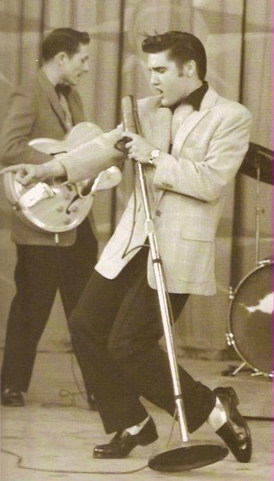
Over at the Journal American, columnist Jack O’Brien conjured up pretty much the same sleazy image. “Elvis Presley wiggled and wriggled with such abdominal gyrations that burlesque bombshell Georgia Sothern really deserves equal time to reply in gyrating kind … He can’t sing a lick, makes up for vocal shortcomings with the weirdest and plainly planned, suggestive animation short of an aborigine’s mating dance.”
In the Herald Tribune TV critic John Crosby leaped on the dog pile. “One thing about Elvis Presley, the convulsive shouter of rock ’n’ roll songs,” Crosby declared, “[is that] this may be the end of rock ’n’ roll after all and just conceivably a return to musical sanity. I mean, where do you go from Elvis Presley? The last appearance of this unspeakably untalented and vulgar young entertainer brought forth such a storm of complaints both from press and public that I imagine any entertainer would hesitate to try him again on television. But, as I say, where do you go from Elvis, short of open obscenity which is against the law? Popular music has been in a tailspin for years now and I have hopes that with Presley it has touched bottom and will just have to start getting better.”
The assaults on Presley came from other directions as well. In a letter to Milton Berle, high school music teacher Harry A. Feldman decried Elvis’ influence on music and teenagers’ morals. “Elvis Presley presented a demonstration which was in execrable taste, bordering on obscenity,” Feldman proclaimed. “The gyrations of this young man were such an assault to the senses as to repel even the most tolerant observer. When television entrepreneurs present such performers to millions of viewers and pronounce them great; when such deplorable taste is displayed in the presentation of primitive, shoddy and offensive material, one begins to understand the present day attitude of our youth. We in the classroom can do very little to offset the force and impact of these displays in our efforts to stem the tide toward a cultural debacle.”
• Even a New York DJ lectured Elvis
The Berle appearance even brought Presley criticism from inside the music industry. On June 7, disc jockey Jerry Marshall of WNEW in New York decided to censure Elvis on his radio program. “I think that Elvis and the people handling him should be interested in his future and building his popularity into something more lasting than a present-day craze,” Marshall declared just prior to playing a Presley record. “Elvis will have to drop the ‘hootchy kootchy’ gyrations or end up as ‘Pelvis’ Presley in circus side shows and burlesque, where he will not find the biggest crowds and financial rewards.”
Entertainer Steve Allen was in a quandary when the controversy exploded over Presley’s performance on the Milton Berle show. Allen disapproved of Elvis’ display but was contractually bound to feature Presley on his Sunday night NBC variety show on July 1. Allen felt the need to address the issue, and so a few days before Elvis’ scheduled appearance on his show, Allen wrote a response letter to TV critic Charles Mercer. The letter appeared in newspapers across the country. At the outset, Allen seemed to defend Elvis on one hand while agreeing with his critics on the other.
“The anti-Presley arguments I’ve been hearing seem a bit illogical,” Allen explained. “You see, he has made many TV appearances before the Berle show, all without arousing any hue or cry, so there can be no firm basis for keeping him off TV altogether. The heart of the matter is that he thoughtlessly indulged in certain dance movements on his last TV appearance which a number of people thought objectionable.”
On the subject of Elvis’ talent, Allen again straddled the fence. “Who is to say that Elvis has no talent?” asked Allen. “You say it, and a few million other people might be found to support you, but I am sure that additional millions will rise to his defense and say that he has oodles of talent.”
• Elvis knew he made a mistake, said Steve Allen
Allen then, amazingly, took it upon himself to apologize on Elvis’ behalf for the Berle “Hound Dog” routine. “He knows he made a mistake with the Milton Berle business,” Allen professed, “and I think he’s smart enough not to do it again. We all make mistakes, don’t we? And we all like to be forgiven.” Allen closed his written apology for Elvis by assuring TV viewers that they will not be “offended by Elvis on any program over which I have control. We’ll show you a new side of the boy.”
The ultimate fallout over Elvis’ controversial performance of “Hound Dog” on the Milton Berle Show of June 5, 1956, is that all of the condemnation heaped on Presley immediately afterward backfired on the critics who did the heaping. By ratcheting up the controversy, the pundits made Elvis even more popular. The critics continued to denounce Presley, but his increasing number of young supporters dug in their heels in his defense.
During the first half of 1956, when Elvis Presley brought his show to town, local press coverage varied widely. After June 5, however, Elvis was front page news everywhere he went. No single event gave Elvis Presley’s career a greater boost than that provided by those two-and-a-half rock ’n’ rollin’ minutes on Uncle Miltie’s show on June 5, 1956. — Alan Hanson | © October 2010
Go to Elvis on TV
Go to Home Page

"Presley’s profile exploded. His role as a polarizing figure expanded. He attracted larger crowds and defenders on one hand and more increasingly inflamed critics on the other."

